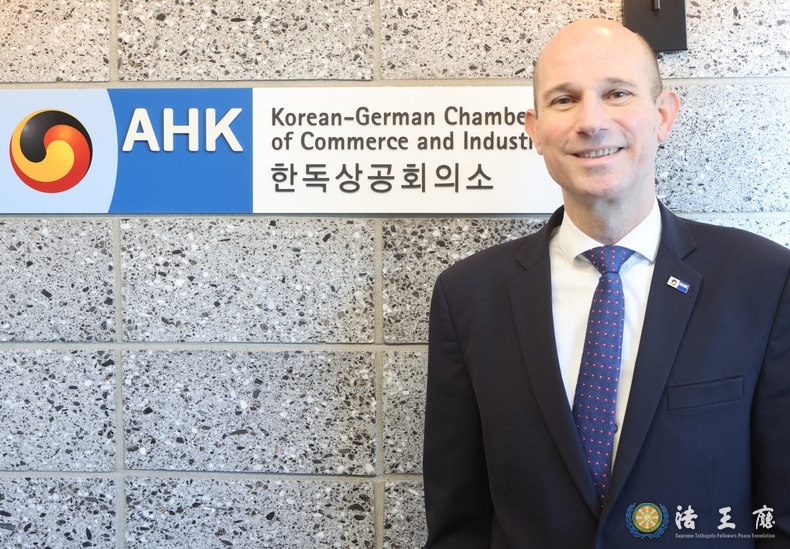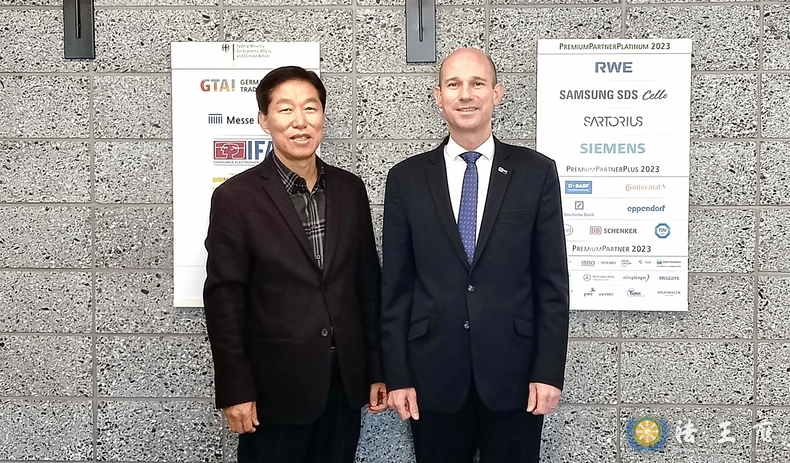By Lee Jon Young
“Korean-German Chamber of Commerce and Industry (KGCCI) has been serving as Secretariat of the German-Korean Energy Partnership in Korea,” said Dr. Martin Henkelmann, President & CEO of KGCCI.
In an exclusive interview with the Diplomacy Journal, President Henkelmann said, “We have been serving as Secretariat of the German-Korean Energy Partnership in Korea for around 3 years. Furthermore, Renewable Energy and Energy Efficiency are addressed intensively through numerous B2B meetings, conferences and delegations which we organize constantly.”

Noting that German companies have made outstanding contributions to the bilateral economic and business development between Germany and South Korea, CEO Henkelmann said, “Hundreds of thousands of Koreans have been working with German companies over the past more than 60 years. The cumulative investment has been at a total of 18 billion U.S. dollars since the 1960s.”
He continued to say, “In celebration of the 140th anniversary of Korean and German diplomatic relations this year, KGCCI hosted “140 guide walkers” joint CSR event in September this year in Seoul. Through the CSR event, KGCCI donated 140 white canes for visually impaired people and all participation fees were dedicated to enhancing transportation services for the visually impaired.”

The following is the full-text of the Diplomacy Journal Interview with Dr. Martin Henkelmann, President & CEO of KGCCI.
Question: Please introduce brief history of KGCCI in Korea.
Answer: The Korean-German Chamber of Commerce and Industry (KGCCI) was founded in 1981 and it is the second largest foreign chamber in Korea with 28 bilingual and trilingual employees and about 500 members. KGCCI has mainly three roles: (1) to cater to the needs of its member companies; (2) to provide services to German and Korean companies and associations to enable more trade between the countries; and (3) to share knowledge and expertise with stakeholders from politics and administration to strengthen the bilateral trade relations.
Q: Would you introduce major achievements and contributions of KGCCI for the Korea-Germany economic development to date.
A: Since its founding, KGCCI has been at the forefront to grow the German-Korean business relations and with this KGCCI has strongly contributed to the increasing trade volume and strong bilateral investment. KGCCI has organized uncountable B2Bs, delegations trips and events. With its rent out office space, KGCCI has been a launching pad for hundreds of German companies for the past decades.
KGCCI has set up uncountable meetings with Korean and German politicians and administration to explain, share, educate about Korean-German business relations and what is needed to even make the business relations stronger. KGCCI has also organized high profile events with involvement of the Presidents to uncountable meetings about details and practical cases and issues.
Reflecting on the past decade, notable programs include:
Vocational Training: Currently more than 600 trainees and around 280 specially prepared trainers in about 140 service centers are part of this unique program. 127 trainees have already successfully completed this dual education program.
Honoring Innovations and collaboration between Korea and Germany in the form of the Innovations Awards which we held for the 9th time in November, 2023.
Women mentoring program WIR (Women in koRea) provides a platform for young professional women to build a strong and sustainable network and grow professionally. It is created with the belief that mentorship is a two-way exchange where all participants, regardless of background and job titles, gain from shared insight. WIR aims to collaborate and solve the pressing issues facing women leaders in today’s dynamic business environment through the mentorship program.
Positive footprint: CSR activities, collecting donations and volunteer work of walking with visually impaired this year to commemorate the 140th anniversary of Korea-Germany. KGCCI donated 140 white canes for visually impaired people and all participation fees were dedicated to enhancing transportation services for the visually impaired. BDO Sunghyun donated 5 million won and Deutsche Bank AG Seoul Branch contributed to assist the people with visual impairments. Henkel Korea supported the cause by donating 3,400 products to all participants of the 9th Harmony Marathon. TÜV SÜD Korea, Adidas and Daimler Truck Korea also donated gifts for the event.

One focus topic is also the energy transition. We have been serving as Secretariat of the German-Korean Energy Partnership in Korea for around 3 years. Furthermore, Renewable Energy and Energy Efficiency are addressed intensively through numerous B2B meetings, conferences and delegations which we organize constantly.
Q: Briefly introduce Korean-German Energy Partnership.
A: After years of bilateral communication through the Energy Dialogue, Korea and Germany have decided to strengthen collaboration on energy transition. At the end of 2019, Minister Peter Altmaier of the German Federal Ministry for Economic Affairs and Energy (BMWi, now: German Federal Ministry for Economic Affairs and Climate Action-BMWK) and former Minister Yun-mo Sung of the Korean Ministry of Trade, Industry and Energy (MOTIE) signed a joint declaration of intent on the establishment of an Energy Partnership, aiming to enhance collaboration on energy policy.

After being designated as the official secretariat of the Korean-German Energy Partnership in 2021, KGCCI with adelphi together underpins cooperation between the two countries in various areas, facilitating interactions between policy makers and energy experts in close cooperation with stakeholders from both countries. In specific, KGCCI co-organizes and executes Korean-German Energy Partnership Working Group Meetings, energy workshops, expert meetings, delegation trips, and is also the co-organizer of the Korean-German Energy Day.
Q: Tell us more about Ausbildung program.
A: Ausbildung program is dual vocational training education from Germany, where on the job training and theoretical education from school are carried out simultaneously. Germany utilizes this program in over 300 career sectors including auto mechanic, baking, dental technician, policemen, banking, and around 1.5 million trainees participate in the Ausbildung program annually. In addition to Germany, more than 30 nations worldwide are implementing the Ausbildung program.
From 2017, KGCCI started the Ausbildung program with the initiation of German Automobile manufacturers, BMW Korea and Mercedes Benz Korea. Currently, all German automobile brands, Daimler Truck Korea, Man Truck & Bus Korea, Porsche Korea, and Volkswagen Group Korea are participating in the Ausbildung program.
In Korea, there are four Ausbildung professions - auto maintenance, car body, painting and service advising. Trainees sign an employment contract with the official dealerships of German Automobile brands. Under the instruction of DIHK certified trainers, trainees receive on-the-job training (70%) at work and theory-based education from colleges (30%). Excluding the military service period, trainees complete a 36-months long program with a college degree and DIHK Ausbildung certificate.
Q: Please introduce outstanding German companies doing business in Korea.
A: It is impossible to share all the outstanding contributions that German companies have made over the 140 years of German-Korean relations. Hundreds of thousands Korean have been working with German companies over the past more than 60 years. The cumulative investment has been at a total of 18 billion U.S. dollars since the 1960s.
Q: We are celebrating the 140th anniversary of diplomatic relations between Korea and Germany this year. Please let us know special economic events carried out this year.
A: The largest economic event was the Business and Investment Summit in June 2023 in Frankfurt. The German-Korean Business and Investment Summit, co-organized by the Korean-German Chamber of Commerce and Industry, the German Chamber of Commerce and Industry (DIHK), the Frankfurt Chamber of Commerce and Industry (IHK Frankfurt am Main) and the Korea Trade-Investment Promotion Agency (KOTRA) marked a milestone in the bilateral economic ties between Germany and Korea.
Additionally, many events are part of our regular series of gatherings and conference including two economic outlooks in Seoul and Busan respectively, a conference on offshore-wind energy, on circular economy. Over the past year, we have been in the lead for around 20 delegation trips to Korea and Germany and have supported uncountable visits.
Q: Please let us know your major business objectives next year.
A: KGCCI is expanding its footprint with a new business location to cater even better its clients, partners and stakeholders. Our goal is to foster increased collaboration between Korean and German companies through delegation trips in order to have more economic exchange, to enhance joint research, and to partner to go into third country markets. As soon as companies meet, they find the right topics, use their innovative power, and know best how to grow together.
Furthermore, we are actively participating in prominent trade fairs such as IFA, Messe Berlin and Messe Stuttgart, further strengthening our commitment to promoting bilateral business relations between the two countries.
Q: Please introduce yourself in detail, including your career, family and hobbies.
A: Born in 1971, I grew up in Mönchengladbach, West Germany, spent one year in High School in the USA, then graduated in my hometown. I signed up for 2 years military service. I studied law, made a master’s degree in international law in France and the 1st and 2nd state examination in Germany. I hold a PhD with a thesis on European and international law.
I worked as a lawyer in Germany, afterwards focused on advocacy work in Brussels and Berlin first within a consultancy, then for large business associations. In 2014 I joined the Network of German Chambers abroad (AHK) leading the AHK Tunisia, then the AHK Philippines and since 2021 KGCCI.
Together with my wife, a French jurist, and our two children I live since then in Seoul.
For more than 40 years, I have been passionate and active about playing tennis and field hockey, both I do on a regular base in Korea as well.
















